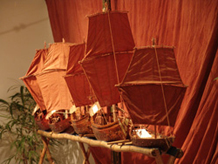Friendship (NGO)
Friendship (NGO) is a non-governmental organization dedicated to improving the lives of marginalized communities in some of the most remote and underserved regions of the world. Founded in Bangladesh in 2002 by Runa Khan, Friendship has expanded its reach to serve people in need, focusing on areas such as healthcare, education, sustainable economic development, disaster management, and cultural preservation.
History[edit | edit source]
Friendship was established with the vision of empowering the impoverished communities living in the char lands of Bangladesh. These are riverine islands in the Brahmaputra and the Ganges rivers, where geographical isolation exacerbates poverty and limits access to basic services. Over the years, Friendship has grown from a small-scale operation into an international NGO, with projects also running in other countries facing similar challenges.
Mission and Vision[edit | edit source]
The mission of Friendship is to foster hope among marginalized communities and to create opportunities for them to transform their lives. Its vision is a world where people, especially the most vulnerable, have the power to uplift themselves from poverty, with dignity and harmony. Friendship aims to achieve this through an integrated development approach, addressing the multifaceted aspects of poverty.
Programs and Services[edit | edit source]
Friendship's programs are diverse, designed to address the critical needs of the communities they serve. These include:
Healthcare[edit | edit source]
Friendship provides essential healthcare services through a network of floating hospitals, static clinics, and community medic-aides. These services are crucial in areas where medical facilities are scarce or non-existent.
Education[edit | edit source]
Understanding the importance of education in breaking the cycle of poverty, Friendship runs educational programs for children and adults. These include formal schooling, non-formal education, and vocational training.
Sustainable Economic Development[edit | edit source]
To ensure communities can sustain improvements, Friendship focuses on economic empowerment through skill development, microfinance, and support for agriculture and small enterprises.
Disaster Management[edit | edit source]
Given the vulnerability of the regions Friendship works in to natural disasters, the organization has programs in place for disaster risk reduction, emergency response, and post-disaster rehabilitation.
Cultural Preservation[edit | edit source]
Recognizing the importance of cultural identity, Friendship also works on preserving the heritage and traditions of the indigenous communities it serves.
Impact[edit | edit source]
Friendship's impact is evident in the improved quality of life for the communities it serves. Its healthcare programs have made healthcare accessible to millions who were previously underserved. Education initiatives have provided children and adults with the knowledge and skills needed for a better future. Economic development programs have empowered individuals to improve their livelihoods, and disaster management efforts have made vulnerable communities more resilient.
Challenges and Future Directions[edit | edit source]
Despite its successes, Friendship faces ongoing challenges, such as the changing climate, political instability in some regions, and the need for sustainable funding. The organization continues to adapt its strategies to meet these challenges, with a focus on innovation, partnerships, and advocacy to ensure the sustainability of its programs.
See Also[edit | edit source]
Search WikiMD
Ad.Tired of being Overweight? Try W8MD's physician weight loss program.
Semaglutide (Ozempic / Wegovy and Tirzepatide (Mounjaro / Zepbound) available.
Advertise on WikiMD
|
WikiMD's Wellness Encyclopedia |
| Let Food Be Thy Medicine Medicine Thy Food - Hippocrates |
Translate this page: - East Asian
中文,
日本,
한국어,
South Asian
हिन्दी,
தமிழ்,
తెలుగు,
Urdu,
ಕನ್ನಡ,
Southeast Asian
Indonesian,
Vietnamese,
Thai,
မြန်မာဘာသာ,
বাংলা
European
español,
Deutsch,
français,
Greek,
português do Brasil,
polski,
română,
русский,
Nederlands,
norsk,
svenska,
suomi,
Italian
Middle Eastern & African
عربى,
Turkish,
Persian,
Hebrew,
Afrikaans,
isiZulu,
Kiswahili,
Other
Bulgarian,
Hungarian,
Czech,
Swedish,
മലയാളം,
मराठी,
ਪੰਜਾਬੀ,
ગુજરાતી,
Portuguese,
Ukrainian
Medical Disclaimer: WikiMD is not a substitute for professional medical advice. The information on WikiMD is provided as an information resource only, may be incorrect, outdated or misleading, and is not to be used or relied on for any diagnostic or treatment purposes. Please consult your health care provider before making any healthcare decisions or for guidance about a specific medical condition. WikiMD expressly disclaims responsibility, and shall have no liability, for any damages, loss, injury, or liability whatsoever suffered as a result of your reliance on the information contained in this site. By visiting this site you agree to the foregoing terms and conditions, which may from time to time be changed or supplemented by WikiMD. If you do not agree to the foregoing terms and conditions, you should not enter or use this site. See full disclaimer.
Credits:Most images are courtesy of Wikimedia commons, and templates Wikipedia, licensed under CC BY SA or similar.
Contributors: Prab R. Tumpati, MD


